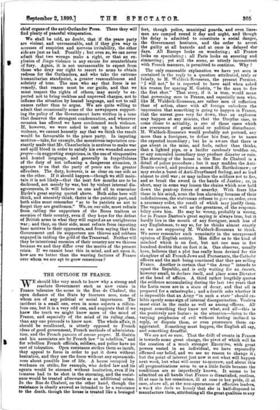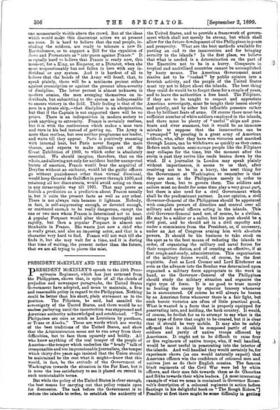THE OUTLOOK IN FRANCE. Av E should like very much to
know why a strong and resolute Government such as now exists in France tolerates the scene in the Rue de Chabrol, the open defiance of the State by fourteen men, none of whom are of any political or social importance. The incident is a small one, even in some aspects a ridicu- lous one, but it is a very odd one, and suggests that if we knew the truth we might know more of the mind of France, and especially of the mind of its ruling .class, than any one pretends to know now. The whole affair, it should be recollected, is utterly opposed to French ideas of good government, French methods of administra- tion, and the French passion of amour propre. M. Guerin and his associates are by French law " in rebellion," and for rebellion French officials, soldiers, and police have no sort of toleration. Open resistance strikes them as insult, they appeal to force in order to put it down without hesitation, and they use the force without any squeamish- ness about possible loss of life. A house occupied by workmen on strike, for example, who defied law and its agents would be stormed without hesitation, even if its inmates had to be shot in the storming, and the resist- ance would be treated afterwards as an additional crime. In the Rue de Chabrol, on the other hand, though the resistance is clearly avowed as intended to be a resistance to the death, though the house is treated like a besieged fort, though police, municipal guards, and even lines- men are camped round it day and night, and though the delay is admitted to constitute a social danger, the Government hesitates, and the order to arrest the guilty at all hazards and at once is delayed •for. days. All Europe looks on wondering ; all France looks on speculating ; all Paris looks on sneering and simmering ; yet still the scene, so utterly inconsistent with French manners, is permitted to continue. Why ?
The only reasonable explanation we have yet seen is contained in the reply to a question attributed, truly or falsely, to M. Waldeck-Rousseau, the present Premier. "I will not," he is reported to have said when asked his reason for sparing M. Guerin, "be the man to fire the first shot." That story, if it is true, would mean that governing men in France, and especially men who, like M. Waldeck-Rousseau, are rather men of reflection than of action, share with all foreign onlookers the impression that something is going to happen in France, that the unrest goes very far down, that an explosion may happen at any minute, that the Dreyfus case, to come closer to actuality, is one of those cases which are precursors of great social or political disturbance. M. Waldeck-Rousseau would probably not pretend, any more than a foreigner, to define his s fear, or to name the expected incendiary ; but he is aware that there is gas about in the mine, and feels, rather than thinks, that a lighted pipe, or a lucifer carelessly trodden on, or any concealed incendiary may produce disaster or ruin. The storming of the house in the Rue de Chabrol is a detail of police procedure ; but it may madden the Anti- Semite crowd, and produce a second St. Bartholomew; or may evoke a burst of Anti-Dreyfnsard feeling, and so lead almost to civil war ; or may induce the soldiers not to fire, and so break the sword in the hands of Justice ; or, in short, may in some way loosen the chains which now hold down the pent-up forces of anarchy. With fears like these in his mind, none the less alarming because of their indefiniteness, the statesman refuses to give an order, even a necessary order, the result of which may justify them. The vagueness, as well as the greatness, of the responsi- bility cows him. He may be wrong, probably is wrong, for in France Danton's great saying is always true, but it hardly lies in the mouth of any foreigner, much less of any Englishman, to say so, for he thinks almost exactly as we are supposing M. Waldeck-Rousseau to think. We never remember such unanimity in the unexpressed opinion of English society. Men differ as to the kind of mischief which is on foot, but not one man in five hundred doubts that on foot it is. One observer, usually keen, believes that a plot has really been devised for the slaughter of all French Jews and Protestants, the Catholic officers and the mob being convinced that they are selling France. Another is certain that "the Army" intends to upset the Republic, and is only waiting for an emeute, however small, to declare itself, and place some Dictator at the head of affairs. A third rather lengthily quotes the evidence accumulating during the last two years that the Latin races are in a state of decay, and that all is prepared for a catastrophe ; and a fourth asks whether it is impossible that an Army "in such a state" should ex- hibit openly some sign of internal disorganisation. Voulets must exist in the ranks as well as among officers. All expect something they know not what, and all—this is the positively new feature in the situation—listen to the varying prophecies of evil without feeling inclined to reply, or dispute them, or even pronounce them ex- aggerated. Something must happen, the English all say, and something dreadful.
We are not so sure. That the drift of events in France is towards some great change, the pivot of which will be the creation of a much stronger Executive, with great powers vested in an individual, we have repeatedly affirmed our belief, and we see no reason to change it ; but the point of interest just now is not what will happen next week, but what will occur to-morrow, and about this all prognostications seem to us a little futile because the conditions are so imperfectly known. It seems to be admitted on all hands that France is dissatisfied, restless, ill at ease in her conscience, ill at ease in her pride, ill at ease, above all, at the non-appearance of effective leaders, a wal. t she feels so keenly that she is half-disposed to manufacture them, attributing all the great qualities to any one momentarily visible above the crowd. But of the ideas which would make this discontent active we at present see none. It is hard to believe that the real people, in- cluding the soldiers, are ready to tolerate a new St. Bartholomew, or to support a Bill for the expulsion of Jews and Protestants as " intresuers against France." It is equally hard to believe that France is ready now, this moment, for a King, an Emperor, or a Dictator, when she most unquestionably has not fallen in lave with any in- dividual or any system. And it is hardest of all to believe that the bonds of the Army will break, that, to speak plainly, there will be a mutinous protest either against conscription or against the present ultra-severity of discipline. The latter protest is almost unknown in modern armies, the men avenging themselves on in- dividuals, but submitting to the system as indispensable to ensure victory in the field. Their feeling is that of the men in a pirate ship,—that discipline is an abomination, but that if the Captain is not supported there will be no prizes. There is an indisposition in modern society to push anything to extremity. France is certainly restless, but it is with the restlessness which makes a man turn and turn in his bed instead of getting up. The Army is more than restless, but sees neither programme nor leader, and waits till they appear. Paris is positively steaming with internal heat, but Paris never forgets the main thence, and expects to make millions out of the Great Exhibition of 1900, to which order is absolutely essential. We should imagine, therefore, that on the whole, and allowing not only for accident but for unexpected bursts of emotion, France would bear the acquittal of Dreyfus without an outburst, would let the guilty officers go without punishment other than virtual dismissal, would keep General de Galliffet in power through 1900, and retaining all her discontents, would avoid acting on them in any catastrophic way till 1901. That may prove as foolish a prediction as a prediction about France usually is, but it suits the present facts as well as any other. There is not always rain because it lightens. Nobody, in fact, is self.suppressing enough, or devoted enough, or convinced enough to be really dangerous, except the one or two men whom France is determined not to hear. A. popular Picquart would alter things thoroughly and rapidly, but then a popular Picquart is almost un- thinkable in France. She wants just now a chief who is really great, and also an imposing actor, and that is a character very hard to find, France will not wait till she finds it, but she may wait for a time, and it is during that time of waiting, the present rather than the future, that we are all trying to pierce the mist.



































 Previous page
Previous page